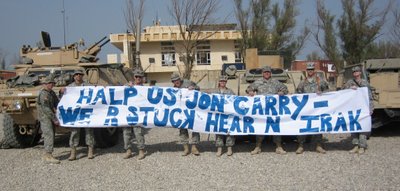"We get into the habit of living before acquiring the habit of thinking."
~ Albert Camus
Sunday, December 31, 2006
a Day in the Life...
We spent our afternoon with the priests who reside in the visitors’ house in Castel-Pere. Fr. Charlie has lived in Haiti for 43 years. He now stays in the room diagonal from mine and helps our Fr. Marc, the director. Fr. Patrick, a Jesuit priest, visits Haiti often and speaks very good Creole. He has traveled the world and seen places and people that most only ever read about in National Geographic. His presence in the quad will be sorely missed when he departs on Tuesday.
At the dinner table last night, we learned about Fr. Patrick’s adventures in Chad with the Sudanese refugees in the 1960s. The priests retired early to shower and hit the hay. The volunteers and visitors decided to go into town, meet up with Eddie and Yves (two Haitian employees of Pwoje Espwa and Andy’s roommates) at the Bay Club. The Bay Club sits on the coast right across from Ilse-a-Vache. There’s always a nice breeze and rum can be ordered by the bottle for a mere $7. Conversation ranged from the quality of life in Les Cayes, which far exceeds that of other regions in terms of safety, to the truly fine character of those working here in Pwoje Espwa, to our wishes and dreams for the future.
At church today, we baptized 3 babies, sang with the choir, learned how to give the kiss of peace in Creole and sweated profusely. Then, before lunch, Andy and I went out to a field where I tried out my skills on a motorcycle. Andy’s a good teacher but 5 little kids decided to help me too – and I had an audience of 20 who were tremendously amused by my inability to kick start, my propensity to stall and my jerky gear-shifting. I shall conquer the bike, however, and after than I’ll learn how to drive these big, stickshift trucks. My freedom may be restricted because of my gender (truly, in Haiti this is the case), but I’ll do my best to expand my options while I’m here.
This afternoon, post-siesta, Fr. Patrick lived up to the reputation of his order and sat down with Charlotte, Rob and I to teach us a little Creole. His teaching, so exacting and methodical, allowed us to chat with children in their native language after just an hour. Of course, we only asked things like “koman ou ye?” (how are you) and such. He also explained the definitive reasons why Kreyol (Haitian Creole) is separate language and NOT a patois. Apparently, the language is made up of primarily three African languages spoken in the “arm pit” of Africa (Benin, Togo, Nigeria, etc.). The slaves here created a melded language in order to communicate and then added some French from what they heard their masters say. In the early 1700s Kreyol was born.
Tonight, obviously, we celebrate the New Year! Our plans are unconfirmed, as yet. The party for which Fr. Marc wanted me here (the reason I came early and not after the New Year as originally intended) will not occur. The employees of Pwoje Espwa decided that since they could not even afford presents for the kids at Christmas, they could not justify a party for themselves.
Saturday, December 30, 2006
The Crack Cocaine of the Caribbean
Dr. CD, Rob and I stood in the bright sunshine outside the airport, sucking down a tall Pepsi Cola and cold bottles of water, respectively. He explained to us how he had been coming here since the 1970s with his dad and now, in turn, brings his own children along with him. On this trip, he explained, a vacation to Cap-Haitien, his son had brought his all-American, Colorado girlfriend who, before this, had never been out of the country. A vacation in Cap-Haitien, eh… My family thinks I’m slightly daft for wanting to volunteer here; what would they say to this tall, blond American fellow in his faded pink Hawaiian shirt and khaki shorts, heading off to the north for a little R&R?
 If visitors in Haiti have two things in common, it’s an (slight to extreme) eccentric personality and an inability to forget the first time they ever came to the west side of Hispaniola. Dr. CD helps diagnose this phenomenon by calling Haiti the “crack cocaine of the Caribbean islands. After you see Haiti, everything else seems too sterile; Haiti’s so pure and real.” Once you experience the intense smells, clear, bright colors, vivid sunshine, warmth of the people and everything else that is Haiti Cheri, there really is no going back.
If visitors in Haiti have two things in common, it’s an (slight to extreme) eccentric personality and an inability to forget the first time they ever came to the west side of Hispaniola. Dr. CD helps diagnose this phenomenon by calling Haiti the “crack cocaine of the Caribbean islands. After you see Haiti, everything else seems too sterile; Haiti’s so pure and real.” Once you experience the intense smells, clear, bright colors, vivid sunshine, warmth of the people and everything else that is Haiti Cheri, there really is no going back.So here I am, back getting my fix of Haiti. And as a nod to Dr. CD, who is by now enjoying Cap-Haitien with his two lackadaisical children and young Haitian girlfriend (who explains away their vacation to the dry north-country), I was up at 3:45am, buzzing with thoughts and ideas. My room desperately needs organizing, another chapter of D. H. Lawrence beckons me, thoughts in my head scream to escape onto paper; so I acquiesce to the self-nagging and get out of bed. Why not? We all retired by 9:00pm.
While I have to pinch myself on this sunny, breezy, 88º F, December day, the dream is
 somewhat funk-i-fied (for lack of a better term) by certain realities. For one, my little room in the visitor’s quad where I will reside for the duration of my time with Pwoje Espwa desperately for attention (something it’ll get a lot of this week). The lack of hangars, shelves, and table space would drive any anal-retentive personality into a fit of madness. Fortunately, for me, in addition to being quite anal, I can be quite innovative. My suitcase, coupled with a sarong, may prove to be the ideal bedside table.
somewhat funk-i-fied (for lack of a better term) by certain realities. For one, my little room in the visitor’s quad where I will reside for the duration of my time with Pwoje Espwa desperately for attention (something it’ll get a lot of this week). The lack of hangars, shelves, and table space would drive any anal-retentive personality into a fit of madness. Fortunately, for me, in addition to being quite anal, I can be quite innovative. My suitcase, coupled with a sarong, may prove to be the ideal bedside table.From my outpost on day one, the work ahead looms a bit daunting; there is so much that I would like to accomplish here. Still, nothing will quell a feeling that began to grow from the moment I stepped foot onto Haitian soil. Perhaps it is the feeling of my soul expanding or my spirit celebrating or my body relaxing, perhaps a combination of all these things. Whatever the cause, the sensation is at once wonderful, exciting, spiritual and addictive. Neither will it be ignored nor forgotten.
Thursday, December 28, 2006
Wednesday, December 27, 2006
Typical DC Night
Since I have finished the actual act of packing my suitcases (I've been in preparatory/purchasing mode for over a month), I feel as though I can really relax and enjoy my time left in DC. Granted, I've only got about 30 hours to play now but I'm sure it'll be great. Actually, I'm off to a good start.
Tonight we went to McFaddan's. I'd never been before, but heard it's a cool place to hang. To give you an idea, it's a true DC scene: All the preppies come out to play (pink popped collars and all) while the DJ rocks some rap and hip hop. For whatever reason, perhaps because everyone's still home for Christmas holidays or perhaps because of random coincidence, I saw many friends from elementary school, middle school, high school and college. People I haven't seen in over 5 years, in some cases, were just chilling out and having $1 drafts at a Foggy Bottom bar tonight.
On a quiet evening such as this, all the reasons why I love DC and would never want to leave become apparent.
Monday, December 25, 2006
Random Christmas Thoughts
This morning I'm reminded of bright and raucous college parties that my room mates and I threw my junior and senior year. We boogied to the sounds of Sinatra, Big Bad Voodoo Daddy, and the requisite James Brown. This morning I'm saddened to learn that the "Godfather of Soul" has passed at 73 of uncertain causes. Mr. Brown will be sorely missed; whenever I hear his sound I'll think of my happiest college days.
About a month ago, I made the irreversible decision to forgo the giving of gifts. In order to save a buck, I bought cards for all my family and wrote a Christmas thought in each. In return, I had hoped my family would simply give any money they normally spend on gifts to Theo's Work. While I'm ready with my cards this morning, my family seems to be ready with gifts. Eek.
Finally, as I sit blogging this Christmas morning, my family debates the good, the bad and the evil of electronic communication. I have obvious biases and happen to believe that, if used correctly, the Internet enhances certain aspects of life. The conversation now moves to how modernity has screwed everything up -- from personal communication, church, music, and so-forth. I surrounded by GRINCHES!
Merry Christmas. Enjoy the turkey and the gifting.
Sunday, December 24, 2006
debs and what-not
"It'll be what? I'm sorry, is that the frickin' word of the day or something? Did you just complete a Wordly Wise? Who the hell says cathartic?"
"Common, cousin, don't be a dilettante."
"A WHAT?!!"
Brother walks into the building shaking his head. Cousin continues to fume about brother's vocab selection. The date is December 23, 2006. The scene takes place outside the Mayflower Hotel in downtown DC. The event discussed is Mrs. Simpson's annual Debutante Ball.

Last night my brothers, cousin, and college buddy all donned tuxes and headed to the annual debutante ball. This year I followed them dressed in a simple cocktail dress and pumps and planned to have a drink with them at the bar and depart. For the first time in seven years, I would not dance away the evening of December 23rd. My friend Will, who's deployed to Afghanistan just now, has been my escort for almost every year I attended. In a mass email, he bemoaned his general inability to participate in Christmas customs this year but the debutante got first mention. The thing is, it's a really frickin' good time.
Normally I'm shy about sharing that I embraced the old tradition of "coming out" into "society" though these days it's really just an excuse to have a big party around the holidays. Back in the day, it meant young ladies were truly eligible to begin seeing young men romantically. Some might argue that to continue this tradition shows pretension and snobbery; they could be right. But really it's hard to fault those who cling nostalgically to the gentler years of American society. As Mr. Spacetropic notes, "It's a just frightening to think 13 year old girls [today] see so few young women in the media pantheon that attained fame with a college degree, tough standards, intellect, or talent that they worked hard to develop." Pop culture really drags us all into the mud so sometimes an evening spent in silk heels, enormously full skirts, and cumberbuns feels rather refreshing.
So a former deb gets overserved, but she's got elders around to chide her inappropriate behavior. Fathers' coat tails flip in the evening breeze as they sneak out for a cigarette before the ceremonies begin but they sure look proud of the pretty daughters hanging off their arms later. My brothers ogle girls but they're using big words to describe their behavior and my cousin still acts like a cynical jerk but he looks nice doing it. There's just something about having a glass of champagne while listening to a snappy band and watching polished guests mill about a swank hotel that makes a girl feel like she's shittin' in high cotton even if such an occasion transpires once a year.
Perhaps this love for things such as balls and champagne seems incongruous with wanting to live in Haiti for a while. I'll argue that it's just part of the same romantic, idealistic nature. Think what you will but judge not lest ye be judged... and now, at least, you know one of my two secrets.
The other is that I have two ferrets named Ferret Fawcett and Buttercup (who will not join me in Haiti).
Friday, December 22, 2006
the PASS IT ON game
In just under a week, you can read my first "in the field" post -- scripted and posted from the island of Hispaniola. At that time, the pictures and thoughts will be solely focused on life in Haiti. Now would be a great time to let more people know what I'll be doing and that I still need support (moral and monetary). So feel free to add insidetheframe.blogspot.com or portiamills.com to favorite links on your webpages and networking bios. Tell everyone, pass out fliers, WHATEVER! The more people who know what's going on, the better.
Pass it on...
Thursday, December 21, 2006
boite CHECKED!
thank you to my dear brother and friend who offered to help me salvage photographs. Your services are no longer required.
this bumpy, rutted road I travel
Hmmm... Let's talk about the latter for a moment, shall we?
My last laptop had died, as you may recall, under random and untimely circumstances. The hard drive was replaced so now it works as good as new. But recently, oh say, two weeks ago, I purchased a brand spanking new, 17" Macbook Pro. I got a good deal on it and thought, "why not? The next several months of my life are going to entail some serious work on the computer and I should have a good one." Right.
Over the last two weeks I've been loading software programs, new music (20 CDs in total) and uploading literally hundreds of photographs taken on my new D-SLR. Those are now all gone. Sadly, this includes pictures of taken of the Heartland and of my lovely nieces. If you were looking forward to shots of the mechanical bull at that bar in Kansas, please, stop waiting. They're lost in oblivion.
As I cry into my Wheaties, I'm reminded that everything works out for the best so I'm bucking up and trying to get on with my days. After all, I've only one week left to enjoy the city, my friends and my family. Please don't think I'm being melodramatic. I truly have no idea what will happen when I get back from Haiti -- whether I'll live here or in another place, whether I'll travel, return to school, go back to Haiti. This is, in every way, a pivotal point in my life.
I just wish my computer could accompany me at times like this.
Tuesday, December 19, 2006
The Heartland
On Friday, my former nanny, her mother and two of her best friends and I went out to a new outdoor shopping mall between her home in Olathe and Kansas City. Legends has just about every store you can imagine plus restaurants and hotels to crash in before another day of hard-core shopping. Next to Legends sits Cabela's -- the world's foremost outfitter, the Yard House where one can order hundreds of draft beers by the half yard, and other assorted delightful establishments. Since our plan was to have a martini, hit two stores, have some more martinis and appetizers, hit two more stores and so forth, we already knew we'd be
 crashing at the Holiday Inn Express on site. During the course of the evening, items were purchased, mechanical bulls were ridden and fallen from, half-yards were consumed, and creamy, buttery, fattening dishes were consumed voraciously.
crashing at the Holiday Inn Express on site. During the course of the evening, items were purchased, mechanical bulls were ridden and fallen from, half-yards were consumed, and creamy, buttery, fattening dishes were consumed voraciously.The next day I'd really wanted to head over to the Kansas Speedway where beer can be purchased by the 6-pack but was told I'd have to return in September for the NASCAR race. Instead we went to Cabela's. After making our way through the crowd standing around the local country station's mobile outpost and the neon orange sale items, we finally entered outfitting paradise. It was a sensory overload: a REAL fishing pond in the back, a huge aquarium, a game room filled with large stuffed game from all over the world, a shooting range and sprawling floors of hunting, hiking and outdoor gear. Awesome. Besides the Jockey outlet, it was the only place I dropped bones over the weekend.
Sunday - a family day - I hung with my former nanny's lovely and spirited children. We watched the little girl perform a Charlie Brown's Christmas. After biscuits and gravy and barbecue sandwich a little later on, I headed for the airport and jetted off to my next Midwestern stop: Cincinnati.
This three-day stay has been a little different than the Kansas visit. Sitting here in my older brother's living room, I find myself content watching TLC and playing with my 2.5 week-old niece. The surroundings are more familiar since, when my brother and sister-in-law announced they'd be buying a new home together, my parents donated some of our older furniture. It's amazing to see the transformation that maturity and family worked on the dorky, blue-velvet-shoe sporting, eye-liner applying, grumpy teen I knew growing up. His home is wonderfully homey and his family (of all girls) is beautiful.
After walking their athletic golden retriever puppy, my brother and I went out to the local dive to watch the Bengals get their butts kicked. We sat together and shared some imported British lagers and then switched to bottles of good American light beer. Surrounded by adults (of all ages) sporting bright orange and black jerseys emblazoned with their favorite players' names, we chatted about life -- a conversation that probably deteriorated over the hours but became no less enjoyable.
Tomorrow night I'm back to the East Coast to stay for just over a week. I have a lot left to accomplish in the time before I fly out and Christmas will be a (welcome) distraction. My vague efforts at fundraising continues -- check out my status on portiamills.com.
Sunday, December 10, 2006
Historic Moment on the Senate Floor
The usual friendly guards must have been on break, because we got the third degree from every single one -- regarding our ID tags, their location on our clothes, our bags (mine had a computer in it and was unceremoniously flopped on a marble counter), what we could and couldn't bring into the viewing balcony and so forth. The searing attendants then chewed us out for sitting in the front row of the balcony -- but everyone was doing it! Finally, seated in the cramped, velvet-lined seats of the second row, we watched the Senators vote. Every man and woman that walked unto the floor voted "yay" so the vote must have been for something extremely uncontroversial, like a pay raise.
We saw the usual suspects - Kerry, Clinton, Obama, Byrd. Then we saw something profoundly historic: Senate Majority Leader Frist standing on the floor for the last time and speaking to incoming Senate Minority Leader Lott. Living in DC means you get to see stuff like this from time to time and it's cool to remark upon and remember. Living here also means that you get to see how these so-called rival party members act when they are on their home turf. Talk about good old boys -- they're all buddy-buddy, index-finger-pointing and back thumping. It's a bit ridiculous.
There is something about this city though -- I'll miss it.
Tuesday, December 05, 2006
mia
Countdown continues, however -- DEC 28, 2006 I'll hop on a plan and head down south. :-)
Can't wait to tell you all about it -- in the mean time, thanks for reading and supporting.
Monday, November 27, 2006
HELLO OUT THERE!!
Geek squad to the rescue! Something's got to be done about all this...
Tuesday, November 21, 2006
...and now for little comic? relief
Cousin: oh, I got something.
ME: ok.
Cousin: comment on this...
ME: ok.
Cousin: one of the greatest articles I've ever read.
ME: ok... WHAT IS IT?
Cousin: singlehandedly changed my favorite news to BBC.
ME: hahaha
Cousin: and made my life goal to be king...
Cousin: note it was the day before my birthday.
article in question:
Monday, 2 May, 2005
Lion Mutilates 42 Midgets in Cambodian Ring-Fight
Spectators cheered as entire Cambodian Midget Fighting League squared off against African Lion
An African Lion...is responsible for the death of 28 Cambodian Midgets
...the fight was slated when an angry fan contested Yang Sihamoni, President of the CMFL, claiming that one lion could defeat his entire league of 42 fighters.Sihamoni takes great pride in the league he helped create, as was conveyed in his recent advertising campaign for the CMFL that stated his midgets will "... take on anything; man, beast, or machine...
| | ||
My family is so weird.
Tuesday, November 14, 2006
new multi-media website
I just wonder what's going to happen when I have to go it alone with this technology... no 800-mac-help!!! and no Apple store in Haiti.
Friday, November 10, 2006
by the grace of God I go...
Charlotte and Rob - two friends studying medicine at Georgetown - will be joining me in Haiti for just under two weeks to help out with the clinic at Pwoje Espwa.
Ginger - a friend from work - will be joining me in Haiti in June (can't WAIT!).
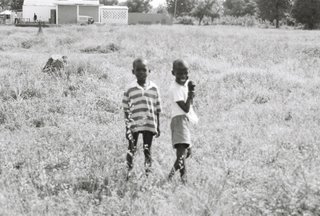
A dude I met at the Ritz store is selling me his D-SLR camera on discount so I can continue my documentary efforts.
Matt - a friend from Cornell - will be working with me on plot lines for a documentary of Pwoje Espwa (maybe he'll come visit too...).
Emily - a friend from work - will continue to brainstorm with me about continuity for the clinic at Pwoje Espwa and other projects.
Friends, colleagues and family continue to contribute in all kinds of ways.
When you're doing what you're meant to do... things seem to fall into place!!
*On another note -- check out my friend Joe's blog. He's living in Africa - working and travelling to all sorts of places (Sudan?!). Not only does his blog make for interesting reading... he's hilarious!
Cheers! Happy weekend!
Thursday, November 09, 2006
the shores of Penobscot

- pink rain - glowing sunset - evergreens growing down onto the beach - steal gray tide - rocky islands - billowing clouds -
My childhood memories are built on Maine's stone-scattered shores. In many ways, my friends and I can say we become who we are today because of the cool summer nights and constant contact with raw nature. The place is a touchstone for us -- a place where we can return to see familiar faces and landscapes. When we take off to far corners, we create a vast network anchored in the deep Penobscot Bay.
I am grateful to all my friends - new and old, relatives too - and especially those with whom I passed endless summers, musing on sun-soaked rocks and gazing upon star-flecked skies. The last months have shown me the significance of these brainstorming and R&R sessions. As we enter the period in our lives when we can aid each other in crucial ways as we struggle to make something of ourselves, I am struck by the loyalty and vitality of our solid foundations.
Wednesday, November 08, 2006
Violet Skies
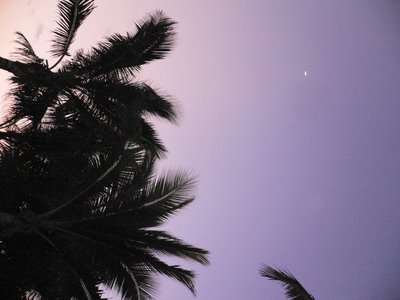
On a clear evening in Mexico, the moon shows like a speck of silver in a glowing violet sky before the sun sinks into the waves of the Pacific. Two beacons of light coexist in one frame - the lesser taking its brilliance from the greater as it mounts the sky. The ephemeral qualities of wisping clouds and dusty rose colored skies recall the transient nature of life.
We wake up each day with a trust that things will go much as they normally do. All we can do is hope and pray they do. We make plans for the future - we invest time and money on these dreams. Often, living for the moment seems a luxury most of us cannot afford. What we cannot, in fact, afford is to not live for the moment. With each passing second, the sun creeps lower and none can tell what moment the last rays will shine.
Tuesday, November 07, 2006
on going prep
I have seen more doctors and dentists in the last month than I have in the last year -- just to make sure everything is OK and I won't have to "pull a Tom Hanks in Cast Away," as one doctor gently put it. I have had every conceivable vaccination (save the Yellow Fever, which is of no apparent concern in Haiti) -- I feel like a pin cushion. Insurance covers nothing for travel vaccinations and between the rabies shots and malaria pills, I am already running up a fairly significant tab. But the strange side effect of all this has been sudden fascination in infectious diseases -- diseases that, in a world of increasing prosperity, continue to ravage destitute populations.
Aside from amassing immunities, I have begun to collect items necessary to living in the 3rd world. One of my friends helped me use e-Bay to find a cheap mosquito net. A colleague who deployed to Haiti in the 1990's recommended a pocket medical guide, which I found and purchased online. My parents offered to spilt the cost of a 10 mega pixel D-SLR. An awesome employee at the Apple store in Bethesda spent hours with me updating software and explaining how to take advantage of my PowerBook's media capabilities. I got a charger and cable for my digital video camera. I also splurged on a set of travel speakers for my iPod -- which will be loaded not only with favorite albums and books on tape, but also kids tunes and educational tracks (I'll be working with hundreds of children, after all). Last weekend, I started practicing my French again with a former teacher (who, incidentally, has visited Haiti under Baby Doc's regime). This weekend I'll begin compiling a travel medicine kit and any outdoor clothing my wardrobe still lacks (slickers, cargo shorts, sturdy sandals...).
The rector of my parish - the Shrine of the Most Blessed Sacrament - posted my upcoming trip in the weekly bulletin and pledged some moderate financial support. My parents have been wonderful in their support. Friends have offered to do what they can -- some already have. As the Christmas season draws near, fundraising will become more difficult. Most likely my efforts will continue electronically from Haiti and into next summer when I can play a more experienced spokesperson for Theo's Work.
Sometimes I am overwhelmed by people's generosity. Sometimes I am disheartened by my inability to spark interest. As I read more about Haiti and those who have already made a small difference there, I grow more determined that this corner of poverty in an otherwise relatively wealthy hemisphere should be eradicated.
Wednesday, November 01, 2006
troops with a sense of humor
Poverty’s Lessons: From Madonna to Microloans
In rural Haiti, a child-centered non-profit called Theo’s Work is helping alleviate the devastating effects of poverty for over 1,000 children, mostly orphans. Founded in 1998, and lead by Father Marc Boivert, this important ‘mission’ is following both the tradition of “teach them to fish,” and the Nobel-class principals of personal economic responsibility, converting despair to hope. In fact, the children there suggested “Pwoje Espwa” as a name for the project -- Haitian Creole for Project Hope.
The small ten-seat aircraft that carried me this fall to the southern Haitian village of Les Cayes only recently began serving small outlying populations. I arrived in time for supper and to see the physical beauty of rural Haiti in last light. Local residents with deep, knowing stares watch visitors from the roadside. The reek of trash affronts my senses at every intersection. Children wander half to completely nude, hair patchy and tinted red from malnutrition, stomachs puffed out. Women walk in slow procession toward the mountains, accompanied by their boney donkeys that carry enormous amounts of unsold charcoal. They will reach their destinations late into the night and turn around hours later to return to try and sell their wares once again.
The state of destitution is shocking. Rather than half a world away, it is barely two hours travel from the Sweet Land of Liberty, the wealthiest superpower on Earth. Haiti - the western third of the Caribbean island of Hispaniola – is barely 600 miles from the U.S. but leagues away in prosperity from even its island-sharing neighbor, the Dominican Republic.
Haitians rank among the world’s poorest. It is hard to imagine, without seeing. A volunteer at Pwoje Espwa described Haiti as the only country with a “sub-title” -- rarely does one read “Haiti” without the collateral phrase, “the poorest country in the Western Hemisphere.” The phrase seems a way to write the country off rather than to draw attention the desperate need.
Much like the economic principal of 2006 Nobel winner Mohammed Yanus, Pwoje Espwa puts the responsibility, and the money, in the hands of those it serves. The organization employs Haitians as house mothers, teachers, school principals, drivers, artists, cooks, nurses, farmers and a myriad of other occupations that opened because of the purchase of a 140 acre farm that produces food and houses hundreds. One of the drivers, who came to Fr. Marc as a child only nine years ago, has now saved enough money to buy land. Eventually, he will build a house.
The artisans – Pwoje Espwa’s kids who make art from oil drums, beads, and twine – were originally handed materials by the project. But the program’s directors found that things – tools and such – would mysteriously go missing. Similarly, the project ‘lost’ three car batteries in one day with not a single driver owning up to their disappearance. The solution: Fr. Marc provided (small) amounts of money, instead of the materials, and required the artists and the drivers to replace anything missing with money from their own profits and salaries. Magically, tools and car batteries stopped walking away.
The Peace Corps has deemed Haiti in a state of civil unrest and keeps volunteers away. Jesuit Volunteers International has followed suit, pulling their volunteers several years ago. The UN certainly has a presence there, but often fails in efficacy because actions frequently get mired in local bureaucracy. The sustainable success stories come from the small grassroots organizations – non-profits that work directly with the people and for the people, and practice sensible, Nobel-class, economic motivation.
Tuesday, October 31, 2006
Missing Wisdom
On Friday I went in to have all four wisdom teeth extracted. Before I knew it, a mask was placed on my nose, my brain lost a grasp on whatever it was I'd been thinking and I passed out. When the nurses woke me and led me back to a bed to lie on, I was furious they hadn't performed the surgery yet - why were they making me wait? A lick of my blood-encrusted lips told me that time had lied and they were already done. I began to sob.
The nurses took me back to a chair to do some last minute things to my face. Why awaiting their final attentions I said, "Gosh, I'm really gonna miss my teeth!" (Har har). When they looked blankly back at me and asked why, I stated simply, "well, I was sorta attached to them for a while..." Perhaps they thought that no one could possibly make a pun while high on as many painkillers as I (or maybe they couldn't appreciate my ridiculously obvious sense of humor) because they fumbled in the back for a moment and then handed me four bloody molars sealed in a plastic bag. Think the tooth fairy pays for big people teeth too?
I spent the weekend enjoying pudding, jello and eventually pizza. The oxycodone helped a lot. I actually thought I'd weathered the whole experience rather well until I spoke with some friends today. Apparently I had a lot of conversations that I don't really remember having...
Good thing I was blogging on those days!
Sunday, October 29, 2006
Impassioned?
The other day, during a routine physical, I recommended my doctor read Tracy Kidder's Mountains Beyond Mountains. I figured that as a doctor, a story about a man who treats infectious diseases might appeal to him. He replied that not only did he not have time but that my passion did not need to become his passion. This struck latter assertion struck me with some force.
Why would I care that he didn't care? Why would I care that a friend won't be coming with me? It occurred to me: precisely because my passion must become his passion -- his or hers any body else's. How can someone make a difference if they can't interest others in their passion? It seems my challenge begins even before I step foot on the island again.
Contributions anyone?
Saturday, October 28, 2006
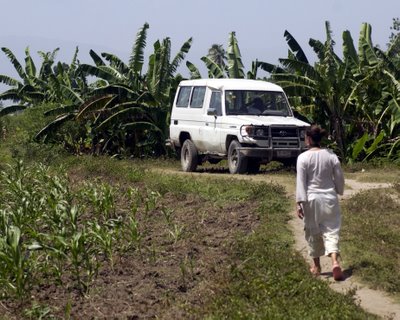 I prepare for my trip with vaccinations, medications, supplies, goodbyes. Time creeps on some days and on others slips through my fingers without notice. For the first time in my life, I am taking a step on my own. The decision feels completely natural and yet terrifies me.
I prepare for my trip with vaccinations, medications, supplies, goodbyes. Time creeps on some days and on others slips through my fingers without notice. For the first time in my life, I am taking a step on my own. The decision feels completely natural and yet terrifies me.My home will be a small room on a farm in southern Haiti. My family will be an eclectic group of Haitian children, families, American and Canadian expats, priests and a smattering of volunteers. I cannot even fathom the extent to which my life will change...
Thursday, October 19, 2006
Philosophizing Winos
Conclusion: The Earth is large, the Universe is larger; the higher you reach, the farther you fall; the first steps toward the next step are the most difficult ones to take.
Monday, October 16, 2006
as a White House Intern...
I was born and raised in Washington, DC. I went to Catholic church every Sunday as a kid - sat listening to homilies with major politicians and talking heads from both the left and right. I studied at a liberal Episcopal high school and attended an even more liberal university in the north. My only exposure to the Christian right, even after Bush and his constituency took over the capital, was an occasional visit with my distant southern cousins. From my limited experience, I formed an idea of what to expect from the Christian right - kind and carefully thought out words, a humble attitude and speech laced with phrases like "God willing" and "I was so blessed."
In the fall of 2005, I served as a White House intern at the USA Freedom Corps Office, a political office located right next to the Faith-Based office on Lafayette Park. The first few days, all the interns sat through talks by various directors and senior staff. The bottom line of all these lectures was - act respectfully and in accordance with the position of privilege to serve in the White House. One director told us that we would now be appealing subjects for reporters because of our proximity to the West Wing. For some of my fellow interns from the mid-west, Utah, and central Texas, this "Washington Post test" was a totally new thing - so this was an important point to make.
I don't know what parallel universe Kuo occupied during his time at the White House but my limited exposure to the people on every level of the Bush Administration was completely different than his. My colleagues spoke of being "blessed" by good fortune, exclaimed "good NIGHT!" when surprised, showed discretion and a deep understanding that their position at the White House meant they were serving the American people. I was constantly reminded that my colleagues and fellow interns came from a different background than I. For the most part, they came from the Christian right and acted just as I expected they would.
Kuo certainly does not exhibit the behavior I witnessed in my semester at the White House. He does not exhibit the humility and discretion I found in those I worked with. 60 Minutes leaped at the story of one of hundreds and hundreds of people who have served this administration - most of whom have known better than Kuo. His book(though perhaps not his moral fiber) ranks with that of Jessica Cutler who wrote Washintonienne - a steamy best seller based on her explicit blogs. Both he and Cutler did the easy thing, made their 15 minutes of fame by depending on their Washington insider advantage.
In Kuo's case, not only do I find him totally reprehensible for playing into the hands of a media eager to say ANYTHING bad about the Bush White House, even if it is contradictory (they're in bed with the Christian right, they mock the Christian right... blah blah blah) but I found him out to lunch in his observations.
Sunday, October 15, 2006
Precisely the Problem...
$53 million of fiscal year 2006 funds for USAID assistance programs
in Haiti, these funds are part of an overall Country Strategy Grant Agreement
(CSGA) covering the next three years (FY 2007 to FY 2009). The total
contribution under the terms of the agreement is estimated to be up to $492
million for all USAID activities that support the Haitian people during this
period.
That's a heck of a lot of money - but then, the U.S. has given a lot of money to Haiti before. According to the article "The United States is Haiti's largest single-country donor and trade partner..." And well, with that amount of money and the U.S. being "committed to work with Haitian citizens and their government over the long term" one would think that a population roughly the size of NYC would benefit greatly.
Where's the hitch? Some how when we read,
USAID will partner with the Government of Haiti to help meet the
basic needs of the Haitian population, focusing on job creation, community
revitalization and empowerment, local government partnerships, expansion of
financial services, watershed development, agribusiness and marketing, public
health care, AIDS prevention and treatment, education services, civil society
and media improvement, judicial and parliamentary systems reform and improved
governance and fiscal policy.
it's hard to believe that it'll come to fruition. Some how, not all the money makes it to the projects for which it's intended. Of course, given the level of destitution there, if even a little of that money trickled down to the outrageously poor we could see a difference.
Unless those who bestowed the 2006 Nobel Peace Prize on Bangledeshi Muhammad Yunus were completely out to lunch, perhaps the U.S., her wealthy and her large non-profit organizations should look closer at this different model for giving. Using the concept of microfinance, Yunus and the Grameen Bank he founded hope to "lift millions out of poverty." If, for example, Madonna, Angelina Jolie and others looked around our Hemisphere for a moment, they might see how some of their pocket change could work miracles on many many children (not just the ones they decide to walk away with). If the money went straight into the hands of the needy...
Friday, October 13, 2006
I'm having trouble seeing past this plank!
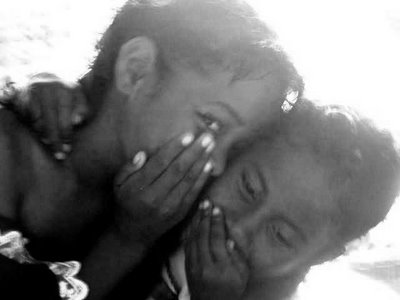
Another friend of mine lived in Micronesia for 2 years. As part of her JVI experience, she tried to live in solidarity with the people and to strive for "simple living." She succeded in these: Coming back to the states left her in a bit of a reverse culture shock.
Yesterday a story was posted on the Pwoje Espwa blog about the latest additions to the Espwa family. The entry reads:
Meet the newest members of the family, Rolider and David Smith.
Their story is too common. The boys had been having stomach problems for
sometime but their family had no money to pay for a visit to the hospital.
Rather than watch the boys suffer their mother made the only choice she could,
take her children to the hospital and abandon them there, hoping and praying
someone would come to their aid. Thankfully Agnes Fednor of Terre de Hommes,
another relief agency in the area, found them, paid for their medical treatment
and watched over them during their hospital stay. After a week Agnes brought the
boys to us and asked if we could take them in. Rolider and David are now
continuing to recover in our care and should be ready to start school next week.
Please keep Rolider and David in your prayers, and especially their mother who
was faced with a choice no one should ever have to make.
Surviving in Haiti will mean changing my frame of reference, my expectations for a "good" day, my capacity to love, my perceptions of reality. We got it so good in this country...
photograph of Micronesian kids taken by Ashley
Wednesday, October 11, 2006
Burning up the Screen...
In recent years, the internet and the blogosphere have begun to have great impact on political and national events. A video posted on Utube and circulated on emails and blogs has lasting impact on the fate of a politician. Opinions glibly scripted on thousands of online journals have the potential to change the way we revere or ignore the nationally syndicated press.
The beauty and bitch of the blogosphere are difficult to separate. The qualities that allow users to create their own voice and use a virtual space to their advantage also allow them to disregard the potential for a very public readership. Ultimately, it comes down to whether the person who sits down at their keyboard feels a responsibility to resist the ease of contributing to useless garbage, harmful slander or plain filth - all too accessible on the net.
For me, making a transition from journal-keeping to blogging requires the simple commitment that the activity would occur daily, a pledge to a potential readership. And the blog, even more so than the journal, must exist in a detached reality - rants structured and veiled, experiences wrapped in external observation, daily activities concealed. But so long as the new venue remains oriented toward personal experience, and away from detached observation of national and international goings on, "Inside the Frame" cannot resemble "Wonkette" or "Instapundit" (examples of some who take the blogosphere by storm).
On the other end of the spectrum from these practically syndicated web logs are those that post what one expects from a young teenager's locked diary (in many cases, the blogger is in fact a rash youth, in other cases one must puzzle over the author's excuse). Examples of the latter are too numerous to count but often include such preambles as "I decided to create this Blog because sometimes all you can do about something is to write about it" or something less premeditated. As much as "Inside the Frame" fails to resemble a popular web-pundit, it fails to resemble these.
Perhaps it was growing up in DC and intrinsically understanding that one does not write (or even sometimes say) what one could not stand seeing in the Washington Post the next day. Perhaps it was growing up Catholic and with a sense of shame that what I wrote might someday be read by my mother or grandmother. Perhaps it was the good horse sense to know that people often forget what's said: "Believe half of what you read and none of what your hear," my grandma always told me. Perhaps it was a combination of all these and many other factors - but I never did understand the brashness that some of my contemporaries exhibit when they record every red letter of activities and thoughts they may later live to regret.
Tuesday, October 10, 2006
Disaster Relief for Southern Haiti
Though the 2006 Hurricane Season is winding down, it is by no means over. Accuweather offers a great way to see what's coming up from the south - you can track hurricanes and their intensity level via satellite imagery. I checked this religiously before my last trip to Haiti. During my first night there when I awoke to the incredible sound of crashing thunder, heard the wind outside and the rain pounding on the roof, I felt secure in knowing it was only a passing storm. The elderly man I stayed with told me, as I sat sipping strong coffee, that he awoke during this night as well and was sure a hurricane was blowing through.
It has only been recently that those living in rural communities in Haiti have had the luxury to
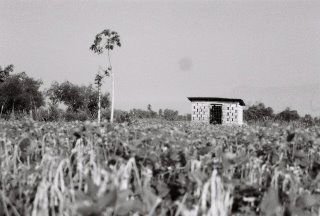 check the weather online. While touring the "computer lab" at Kay Espwa in Les Cayes, Fr. Marc told how when he first moved down they would just lie awake at night and wonder if the storm blowing through would become a hurricane or not. With weather tracking technology and equipment (computers, satellite dishes, telephones) brought in by the Emergency Operations Center, communities in the path of deadly tropical storms should be a lot better off. These are small steps... but steps just the same.
check the weather online. While touring the "computer lab" at Kay Espwa in Les Cayes, Fr. Marc told how when he first moved down they would just lie awake at night and wonder if the storm blowing through would become a hurricane or not. With weather tracking technology and equipment (computers, satellite dishes, telephones) brought in by the Emergency Operations Center, communities in the path of deadly tropical storms should be a lot better off. These are small steps... but steps just the same.Monday, October 09, 2006
Across the Shining Sea
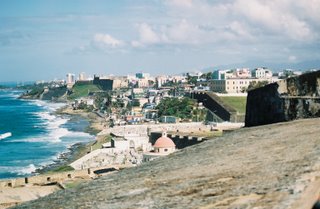 Taken from atop "el Morro," the common name for Fort San Felipe del Morro in Old San Juan, Puerto Rico, this photograph shows ancient gravestones, the old Spanish-style city, the taller modern city and hazy mountains all set on a bay bluer than any gem. Standing here and looking out at this vista, one can imagine why men bled for this land.
Taken from atop "el Morro," the common name for Fort San Felipe del Morro in Old San Juan, Puerto Rico, this photograph shows ancient gravestones, the old Spanish-style city, the taller modern city and hazy mountains all set on a bay bluer than any gem. Standing here and looking out at this vista, one can imagine why men bled for this land.A brief comparison helps in understanding this island and its neighbors. Some of the vital stats of the Caribbean islands:
Haiti (independence from France 1804) - $1,700/capita; life expectancy 53 yrs.
Martinique (department of France) - $14,400/capita; life expectancy 79 yrs.
Guadeloupe (department of France) - $7,900/capita; life expectancy 78 yrs.
^Dominican Republic (independence from Haiti 1844) - $7,000/capita; life expectancy 71 yrs.
Cuba (independence from Spain 1898) - $3,500/capita; life expectancy 77 yrs.
^Puerto Rico (unincorporated US territory) - $18,600/capita; life expectancy 78 yrs.
Jamaica (independence from UK 1962) - $4,400/capita; life expectancy 73 yrs.
The Bahamas (independence from UK 1973) - $20,200/capita; life expectancy 65 yrs.
St. Lucia (independence from UK 1979) - $5,400/capita; life expectancy 74 yrs.
Barbados (independence from UK 1966) - $17,000/capita; life expectancy 73 yrs.
Trinidad and Tobago (independence from UK 1962) - $16,700/capita; life expectancy 67 yrs.
^initially, Spanish colonies
For comparison:
United States (independence from UK 1776) - $41,800/capita; life expectancy 78 yrs.*
 Of course - the list above omits Aruba and the Virgin Islands - and these wealthier still than Puerto Rico in GDP/capita. The former gained independence in the 1980s from the Netherlands and the latter are governed by the UK and USA. These islands still follow in the trend. Perhaps it was the organization system set up by the Brits, or the fact that they stubbornly held on to their colonies the longest but those islands that were under British rule seem generally better off.
Of course - the list above omits Aruba and the Virgin Islands - and these wealthier still than Puerto Rico in GDP/capita. The former gained independence in the 1980s from the Netherlands and the latter are governed by the UK and USA. These islands still follow in the trend. Perhaps it was the organization system set up by the Brits, or the fact that they stubbornly held on to their colonies the longest but those islands that were under British rule seem generally better off.The study of "Europe and its Others" could take longer than a lifetime - but a look at some stats and a visit to some of these "Others" reveals something of state of affairs in these countries before their liberation. Looking at a picture of Haiti's capital
 lays bare the painful difference between a (comparatively) wealthy island and the poorest of the islands.
lays bare the painful difference between a (comparatively) wealthy island and the poorest of the islands.The Caribbean islands explode with color and music, lush jungles and craggy mountains. The music - from Salsa to Reggae to Copa - exudes the contagious spirit of the people. Though my travels within the Caribbean have taken me only to the poorest of Western nations (Haiti) and to Puerto Rico - drinking the coffee, sipping the rum, tasting the fruit and talking with the people betrays a potential that none of these islands have reached.
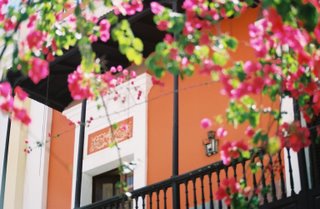 *from the CIA World Factbook
*from the CIA World Factbookphotos by Portia!
Friday, October 06, 2006
Out of the Mouths of Babes
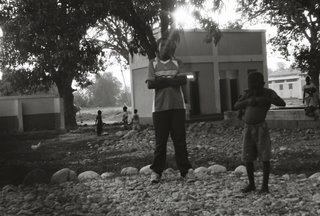 The camera lens acts like a special filter, seeing and capturing things that the naked eye won't. A photograph tells a truth - but a particular truth with an unclear (but real) bias. Esteeming the work of only one photographer is like saying there is only one side to the story. And while photography is an art, it is an easily accessible one for the very reason that many contributors help to create a fuller picture.
The camera lens acts like a special filter, seeing and capturing things that the naked eye won't. A photograph tells a truth - but a particular truth with an unclear (but real) bias. Esteeming the work of only one photographer is like saying there is only one side to the story. And while photography is an art, it is an easily accessible one for the very reason that many contributors help to create a fuller picture.Lest we forget the feeling of looking straight into the bellybuttons and belt buckles of our elders, craning our necks while talking to teachers, and fitting comfortably on the hips of our caretakers, this photograph of two boys in the sun stands as a reminder. Captured on film by one of my little Haitian friends, this scene tells at once as much about the subject as the photographer - who didn't wait for the "perfect" moment to activate the shutter, who held the camera a slight angle, who didn't bother or know to fix the settings.
As we grow, we not only forget what it was like to be young mentally, we forget what it felt like to be short, small, invisible in a crowd... Putting a camera in the hands of a child and
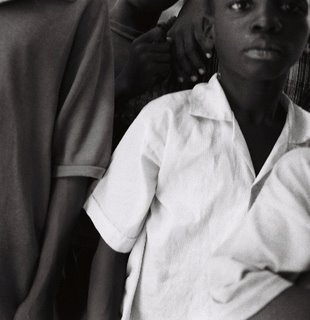 letting a lens do the looking opens a chapter in a book that closed as we entered adolescence. The picture to the right, by another youngster at Pwoje Espwa, betrays a vulnerability difficult for any adult artist to convey.
letting a lens do the looking opens a chapter in a book that closed as we entered adolescence. The picture to the right, by another youngster at Pwoje Espwa, betrays a vulnerability difficult for any adult artist to convey.Photographer Jeffrey Mills (no relation - but hailing from a town not too far from that of my Canadian ancestors) started a project called The Young Haitian Documentary Photographers Group - "social justice through art."
Before this trip [to Haiti], Jeff watched the documentary film "Born into
Brothels." He was inspired. Amazing things can happen when cameras are put into
the hands of youth. Although the purpose of his trip was to volunteer on a road
crew in the mountains above the town of St. Marc, Jeff also brought cameras and
conducted two photography workshops for students. This was the first time these
young photographers had used cameras.
This Canadian photographer helps enable the voices of the Haitian youth and gives their voices a platform.
Thursday, October 05, 2006
Becoming a "Blogger"
Recently my little brother Tony has jumped on the bandwagon with his Pitch 2 Voltage. True to his passion, he posts about new music albums, concerts and anything music related. Then there's me - who recently joined the electronic community in order to talk about my upcoming trip to Haiti and ultimately to use the blog as a venue to write about my projects and experiences there -- photographs always being integral to this endeavour.
The three blogging siblings have emailed back and forth over the last weeks - passing tips and ideas back and forth. Today my older brother told me that he'll be posting about my blog in the coming days. Since popularity in the blogoshere seems to hang on other bloggers posting on, linking to, and commenting on your own blog, this is a very good thing.
Bottom line - since the last week and a half, the slow transformation from casual-Internet-browser into blogger-extraordinaire is in effect.
Wednesday, October 04, 2006
Solving the "Right" Problems
Question: Why do major global organizations fail to have major national impact in Haiti?
Answer: They seek to solve the wrong problems.
Haiti has not come far in the 202 years since its independence. Some would argue that it has taken steps backward in the last half of the 20th century. The lack of progress in the second oldest independent republic in the Western Hemisphere is truly shocking... especially in consideration of its proximity to the United States. So what gives?
Nicholas Eberstaldt , Henry Wendt Scholar in Political Economy at American Enterprise Institute (AEI), writes eloquently of his visit to Port-au-Prince this past summer. In his recent publication he paints a positively tragic portrait of the Haitian capital that might be unbelievable to any who have never visited a Third World country:
...Port-au-Prince is not too poor to have sewage: That humid choking stench is
everywhere. Unending makeshift shacks stretch from clogged "canals," through
which water the color of petroleum slowly trickles: This is at once the communal
latrine and the water supply for washing the evening's cookware.
This is one of several other descriptions in the article that serve to show the reader the unimaginable extent of the need in Haiti. Eberstaldt points out the major global organizations in play. Of the UN troops sent through MINUSTAH (United Nations Stabilization Mission in Haiti) he remarks, "As for MINUSTAH and their 8,800 soldiers and police, some Haitians have taken to calling them TOURISTAH," which completely validates my observations in the south. According to him and others, the Haitian government and other legal statutes limit UN's efficacy. The troops often end up with much time to lounge.
Eberstaldt also notes the long term monetary commitment of both USAID and World Bank to the island nation over the years:
Haiti received a cumulative total of about $3.5 billion (in 2004
dollars) in American aid (economic and security assistance) between 1946 and
2004--that is to say, over the roughly six decades in which its per capita
output achieved a decline of 25 percent. U.S. aid, moreover, was just one of
many sources of concessional official transfers to Haiti. According to the World
Bank, since 1969, Haiti has enjoyed a cumulative total of $8.3 billion in
official development assistance (measured in 2004 dollars).
So in addition to troops, Haiti has access to funds. Does the money go to provide for the poor, feed the hungry, shelter the homeless, heal the sick, protect the vulnerable and educate the ignorant? It does not appear to.
The smaller grassroots non-profits make the greatest direct impact in improving the lives of Haitians. Eberstaldt's "Haiti in Extremis" mentions those few he noticed in Port-au-Prince - GHESKIO HIV Clinic, Mother Teresa's Missionaries of Charity - but there are others both in the capital and the country: Theo's Work in Les Cayes and Paul Farmer's Partners in Health in central Haiti, to name a couple. These organizations fill in where the government and larger non-profits fail.
AEI's political economy scholar points out a little discussed but enormously important fact: None of the efforts of Haitians or outside groups will stick without the security to protect them. This is where larger entities can do the most - and the U.S. may wish to take heed due to Haiti's proximity and reputation for hosting drug-runners. To end on a dreary note:
Without security, efforts to better the national plight will be
doomed to frustration, or worse. Foreign economic assistance will be mainly
wasted, or worse. Humanitarian assistance efforts will find themselves on an
endless treadmill. Economic and humanitarian assistance are no substitute for
security and safety--cannot substitute for it, cannot themselves create it. And
what holds for Haiti holds just as true for other tortured regions of the world
where governments receive foreign aid, but local populations do not receive
safety.
Tuesday, October 03, 2006
the Washingtonian Frame of Reference

From Washington, DC, one can fly direct - or with (tops) one layover - to almost any location on the planet. It is a bit of a small town, none-the-less, despite these and other metropolitan conveniences. And though located a solid five-hour drive South from New York City, America's capital appears far more up-tight - blue and black suits dominate a generally conservative environment. Maybe it's all the lawyers...
Growing up in a place like Washington gives natives a decidedly distinct approach to life. If two happen to discover each other at a gathering, they'll ask, "What school did you go to?" to determine high school (NOT college) education. Washingtonians also tend not to be intimidated by fame or power, but are certainly aware of it and can name (or manipulate) "celebrities" most people have never even heard of let alone seen.
The most difficult part about growing up with the Washingtonian mentality is learning to shift from an inside-the-beltway-centric outlook on life. Power lies in an ability to do this. A myriad of Washingtonians make great impacts on the lives of others - they are the ones who have learned from and harnessed the power that abounds in this city.
Of course, every country has its own characteristics and every capital city will reflect these in part. Washington houses thousands of people of political import from all over the world - this is probably reflective of the fact that (despite the world's hypercriticism), America is a place that many millions of people would like to be, to stay, or to visit. For those that can't - the American energy and spirit has much to offer. To refocus on tiny corners where change is happening as a result of precisely this is to witness miracles.
Monday, October 02, 2006
The Other 4-Letter "F" Word
I decided to take my manual camera on my trip to Haiti. A digital point-and-shoot wouldn't do - I wanted quality prints. For years I tried to stick to my guns about using my old Nikon - and as a consequence, it collected dust for years. Instead, I condemned all those other photographers that forsook the darkroom in favor of digital ease. Now I'm beginning to understand why a photographer friend of mine refers to film as that other dirty word beginning in "F."
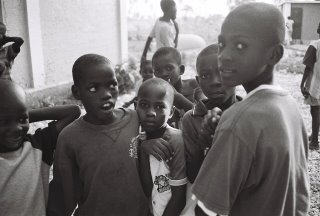 The most disappointing thing to these kids was that they couldn't see their pictures after I snapped them. Who would have guessed that an old manual camera would be such a novelty in a country like Haiti? For the return trip, the manual SLR will be traded in for a digital SLR. Going old-school gets more and more expensive every day...
The most disappointing thing to these kids was that they couldn't see their pictures after I snapped them. Who would have guessed that an old manual camera would be such a novelty in a country like Haiti? For the return trip, the manual SLR will be traded in for a digital SLR. Going old-school gets more and more expensive every day...Saturday, September 30, 2006
Play-Time, a Luxury
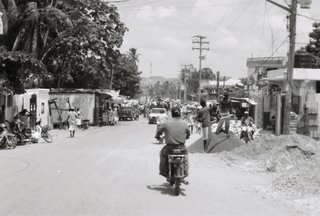
Paved roads, highways, and well-kept country lanes crisscross America's landscape. We don't think twice about getting into sports cars and low-riders before zooming off to our next destination. Ruts and rocks pose no threat to a smooth ride. Aside from clean water, this is the easiest thing to take for granted.
For some, in certain parts of the world, a paved road is a gift. The Taiwanese government bestowed such a gift on the people of Les Cayes, Haiti and the surrounding areas. Driving from town to the beach or over to the airport is a breeze now.
Fr. Marc and those who work with him - in their efforts at Pwoje Espwa - bestow food, shelter, clean water, education and spiritual guidance on hundreds of Haitians. After a time, the children who live at Vilaj Espwa come to take their next meal for granted - a miraculous thing when, if still living with their relatives or parents, they would be lucky to eat once a day.
To step foot onto the farm called Vilaj Espwa is to walk into an oasis surrounded by a tired and desperate land. Kids laugh, run, and play. When they are making mischief, it means they are healthy - this is a very good thing.

Thursday, September 28, 2006
The Perfect Subject
Wednesday, September 27, 2006
"Mommy, I wasn't lost -- I knew where I was!"

We all piled into the family car and headed out to see our cousins in southern Maryland. I guess I was little over 5-years-old. The side of my family we were visiting - the more Italian-Sicilian side - laughed and talked and ate with a gusto that enthralled my young sensibilities. My jolly older second-cousins smothered me into their ample chests and the more youthful third-cousins sucked me into their whirlwind of energy. After food, the kids decided to troop off into the wooded expanse in the back of the house. An adventure!
Hours must have passed before my mother found me - scooped me up and made a scene about where I'd gone, how long I'd been gone and about how EVERYONE was so scared for us! I looked at her with genuine confusion, and with my hands on my hips retorted, "Mommy, I wasn't lost -- I knew where I was!" Nearly two decades later, I find myself stepping out into an unknown world once again and releasing the grip of a hand that would protect me.
September, 2006: 4-am and the rain was pouring down in sheets - some nasty fringe weather from Hurricane Florence or Gordon. Despite the torrents of water, the airplane departed on time and made its way south to Miami. The connection time between flights was tight - 35 minutes to make the 10-am flight to Port-au-Prince. Walking into the waiting area at gate 17 was like walking into another world - a no-man's-land stuck between East Coast city life and Haiti.
The Haitian travelers around me sat in animated conversation with their neighbors or stared blankly at nothing. Pacing with apprehension, I made a few phone calls to ascertain the whereabouts of my fellow travelers who were to join me on this leg of the journey. As I heard the phrase "we're stuck in North Carolina" coming through the earpiece, my mother's parting words roared in my head, "if anything happens to the others - don't go to Haiti alone, whatever you do."
The portly gate attendant blinked at me when I asked to be moved to a later flight. My bag was on its way to Port-au-Prince and I either went with it at 10-am or not at all. Gulp. Ok.
The plane made it safely to the tarmac in Haiti's capitol city. Customs was a breeze. Theodore, the rickety old porter, guided me directly to Jean Gary, a very friendly and well fed taxi driver. Jean Gary took me to a "safe" place I could wait for the others - a gas station restaurant with an armed juvenile "standing guard." The place bustled with Haitians - light and dark, young and old - Dominican and Cuban workers, and UN peacekeeping troops. For over an hour I wrote in my journal and consumed Goya cookies and bottled water - resisting the temptation to call home and explain that I was, in fact, "alone" in Haiti.
My fellow visitors did not make it that day. The first leg of my journey continued without them - but to say I did it alone would be incorrect. With the help of many kind Haitians, I made it to the other airport, booked a flight to Les Cayes and arrived safely there that evening. By night-fall, I had joined Fr. Marc, some volunteers and Pwoje Espwa employees for a feast and a glass of good 5-star rum. I texted my dad that I had made it safely - within a few days I confessed I had made it "alone." Within a few more days, with my guts in a knot, I confessed my adamant intent to return as a volunteer and live at Vilaj Espwa.
Independence, though something all parents must cultivate and nurture in their children, must be a terrifying thing to watch grow. That understood - my job over the next couple months goes beyond fundraising and organizing to move to Haiti. It must be apparent that I take this next step in my life's journey with great consciousness - that my parents realize what I understand: I know where I am.
Tuesday, September 26, 2006
Down a Country Road
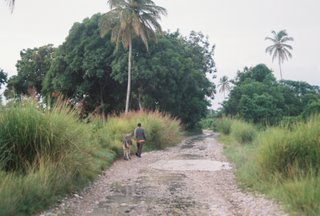
Somewhere in southern Haiti, over one hundred miles from Port-au-Prince, ten minutes drive from a dazzling bay, and down a rocky country road lies a modest expanse of hope called Vilaj Espwa. Within the bounds of this place, girls giggle as they run to class, an older boy cuts a younger boy’s hair, housemothers scrub their laundry, someone’s welding something, painting something, building something, and someone’s eating. Espwa – Haitian Creole for “hope” – blossoms here under the careful governance of Fr. Marc Boisvert.
Vilaj Espwa is a part of Pwoje Espwa – a project that finds its home in a forgotten corner of the Western Hemisphere where, aside from the trucks and the odd rice farmer chatting on his mobile, time seems to have stopped - over a hundred years ago. Fr. Marc moved to Haiti over eight years ago and began by taking in fifteen needy kids. His organization now serves the various needs of over 1,000 children in Les Cayes and the surrounding areas.
At the end of December 2006, I will move down to Haiti to contribute in any way I can. The next few months will be filled with fundraising, sharing Haiti’s story and photographs from my recent trip, and telling of the impact espwa has on a poverty-stricken country.
Monday, September 25, 2006
What We See
A faithful documentation or an image burned into film beg to be believed. History tells us what was so and images show us what was so. What better source for truth than written words of an honest witness or irrefutable pictures captured by a photographer? These are the best instruments of testimony available today. These are all we have - and these are, as humans are, imperfect.
The witness only recounts that which he finds relevant. The photographer only captures that which he finds worthy. What gets left out of the frame?

